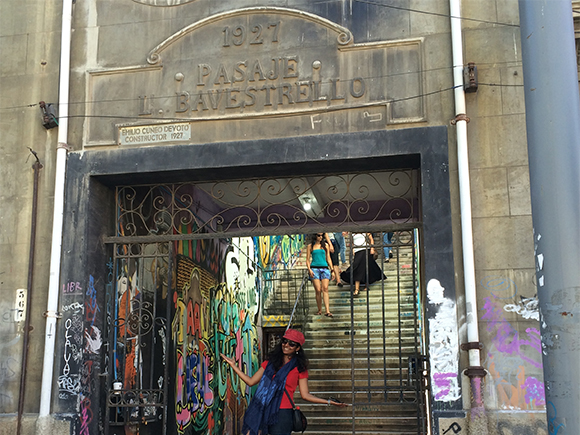
Chile’s Startup Dreams
Tel Aviv. Singapore. Shanghai. All epicenters of startup culture and business innovation outside of the United States. All obvious choices for any Yale MBA student with entrepreneurial aspirations trying to fulfill the School of Management’s International Experience (IE) requirement, which is the position in which I found myself in February of 2015.
Then, there was the less obvious choice: Chile. I had heard rumors that “Chilecon,” South America’s experiment in Silicon Valley-style innovation, was slowly starting to turn out significant startups and attracting a handful of widely recognizable entrepreneurs. Chile has the highest per capita income in Latin America, and the recent story of its economy has been one of great success. The country’s rapid rise to development has been fueled by the well-managed extraction and exportation of abundant natural resources, chief among them copper.

While a discussion of Chile brings many things to mind—its economy, strengthening democratic institutions, South American-inspired food, and European sensibilities—innovation has not always been one of them. Fair or not, the Chilean government knows this perception and is trying to change it.
I was fascinated to learn whether Chile was the dark horse of the global startup race. Was the Chilean government’s investment in innovation paying off? Did Chile have a startup ecosystem that could compete with other global heavyweights? As a Spanish speaker and big-time space nerd, the prospect of spending a few days before the program checking out the birthplace of the Pisco sour, the Carménère grape, and the world-class space observatories in the northern Chilean desert made this non-obvious IE choice especially compelling.

To provide a little background, in 2010, the Chilean economic development agency, Corporación de Fomento de la Producción de Chile (CORFO), began Start-Up Chile as an accelerator program to attract domestic and foreign entrepreneurs to Santiago. The program provides qualified teams with a generous, equity-free investment in return for spending a year developing their companies from Santiago, Chile’s capital. Through Start-Up Chile, CORFO hopes to spark a new culture of entrepreneurship and innovation that over time can help diversify the economy and move the country away from its dependence on natural resource wealth.
In terms of publicity, the program has been a huge success. Interest in the Santiago-based accelerator has grown by leaps and bounds. In 2014 it attracted several thousand teams and applicants from all over the world. There have been many articles written about Start-Up Chile, and the word that Santiago can be a great place to launch a startup is spreading. As an example, when I was checking out the observatories near the semi-desert town of Vicuña, I ran into a would-be-entrepreneur from Virginia who had come to Chile with aspirations of applying to Start-Up Chile. While I’m not certain his plan to open a rock-climbing camp 500 kilometers north of Chile’s capital would be the driver of economic development CORFO was looking for, I was impressed that I stumbed across someone who was also actively thinking about the accelerator program in such a relatively removed locale.

Fast-forward one week and I was visiting Start-Up Chile’s offices in a beautiful old house near downtown Santiago with my fellow IE members. We saw tables full of teams that certainly looked the part—busily developing content, writing code, and otherwise running around with the zeal of what will hopefully produce winning business concepts. One Start-Up participant we spoke to, a former Peace Corps volunteer starting a company that seeks to connect adventure travelers with truly off-the-beaten-path tourist experiences in developing countries, provided some particularly useful insights about the program. CORFO provides 2 million Chilean pesos for accepted applicants in exchange for a one-year commitment to work in the country and participate in some publicity-focused and educational milestones. As of 2014, that amount translated into roughly $40,000 USD—although in 2015, this exchanged closer to $36,000 USD because of the strengthening dollar. Even with these large currency fluctuations, CORFO’s equity-free investment (hint: non-diluting capital) had allowed this team to make substantial progress on their venture given the relatively cheaper cost of living and labor in Santiago when compared to more established entrepreneurial hubs.
Is Chile’s investment in entrepreneurship worth it? Optimist that I am, my verdict is yes, absolutely.
And yet, despite the opportunity, this would-be-entrepreneur dropped several not-very-subtle hints that there was little chance he and his co-founder would be staying in Santiago past the end of the year. It seems that many of the entrepreneurs are happy to take CORFO’s early stage funding, but few have long-term plans to stay in Chile. Many of them aspire to move out of South America and on to the greener pastures of Silicon Valley, Tel Aviv, and Singapore.
To understand why, it is important to realize that in many ways, Chile is still a very conservative country. The country’s major businesses and most influential government positions are filled by a relatively small group of families. It is questionable whether these individuals, already well established, see a need to move beyond the current economic status quo by investing in innovation. As we heard over and over from our visits to various corporate offices and more traditional businesses, there is a perception among these Chilean elite that risky startups are best avoided. Despite the government’s investment in innovation and growing excitement in entrepreneurship, this perception seems to be acting as a major headwind to the development of a true Chilean entrepreneurship culture in two critical ways.
First, it can be very difficult for startups to secure the type of follow-on funding in the country that is often necessary for a new company to reach the next level of productivity or market penetration immediately after completing the program. Venture capital firms are thin on the ground in Chile. We met with two private equity-style investment funds with offices in Santiago that admitted that the great majority of their startup deal flow came from Europe, the United States, and increasingly the Middle East. While these funds had direct connections to CORFO and Start-Up Chile, it appears that for these individuals, investing in homegrown Chilean entrepreneurs is a long game that is not currently realizable.
A second and possibly more difficult bridge to cross is that failure is still very much looked down upon in the higher echelons of Chilean culture. The silver lining that an entrepreneur can learn just as much, if not more so, from failing at a startup is one of the characteristics that has made Silicon Valley and its international counterparts successful. Failure, if not quite celebrated, is widely tolerated as the price to learn how to be a better entrepreneur. This idea seems not to have quite penetrated the mindset of the Chileans in established corporate and traditional businesses. In Chile, failing at a startup can stain the reputation of the would-be entrepreneur for long after the dust has settled.
Beyond the difficulty in building a vibrant funding ecosystem for entrepreneurial ideas at all stages of development, this second perception vastly increases the risks for young, professionally minded Chileans who want to start companies and for more established, moneyed Chileans who want to invest in them. Both risk looking foolish if things don’t work. It would appear that while it is one thing to attract entrepreneurs to your country through generous grants, it is a more complex matter to persuade them to stay in the long term by changing the mindset of investors and those in charge.
With these challenges in mind, is Chile’s investment in entrepreneurship worth it? Optimist that I am, my verdict is yes, absolutely. The value of the publicity and increased prestige that the country has received from Start-Up Chile alone seems to have already greatly outweighed the cost of the program. Moreover, CORFO is getting savvier every year in how they incentivize entrepreneurs to stay in Chile for longer periods; for example, in 2015 CORFO started offering follow-on funding to the top 10 percent of performing Start-Up companies. Institutional investors may not be throwing money at startups coming out of Chilecon now, but they are keeping a close eye on developments and waiting for the right time.
Most encouragingly, judging by the explosive growth of domestic applications to the Start-Up program, there is a sense that a much wider set of professional Chileans and university students aspire to become entrepreneurs. While this enthusiasm will need to catch on among the highest levels of established Chileans to ultimately meet CORFO’s objective to diversify the economy, it is a matter of time before they realize that to stay relevant, sometimes you need to invest beyond the obvious.
